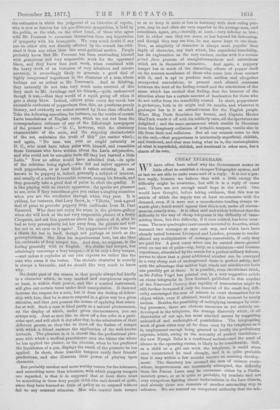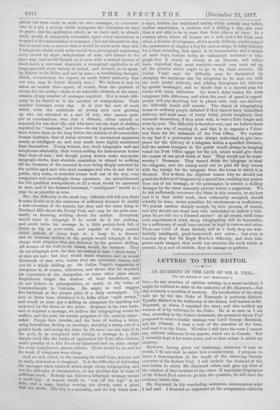CHEAP TELEGRAMS.
WE have often been asked why the Government makes so little effort to establish a cheaper Telegraphic system, and at last we are able to make some sort of a reply. It is not a per- fect reply, because we believe that with a little energy the difficulty might be overcome, but still it is a reply of some sort. There are not enough small boys in the world. One would have thought, before taking evidence, that this was an article of which the supply was at least co-extensive with the demand, even if it were not a manufacture tending always to- wards glut ; but it would appear that this is not, under all circum- stances, exactly true. It is often said and widely believed thatthe difficulty in the way of cheap telegrams is the difficulty of trans- mitting them, but this difficulty, if it ever existed, has been over- come. The new quadruplex instruments invented in America, which transmit two messages at once each way, and which have been already tested between Liverpool and London, promise to render almost any multiplication of messages conceivable, if only they are paid for. A good many wires can be carried above-ground even on one set of poles—say, forty, as a minimum—and German experience, stimulated by the mania for a perfect military defence, serves to show that a great additional number can be conveyed in a very cheap sort of underground drain in perfect safety, and with the advantage that neither high winds nor mischievous fools can possibly get at them. It is possible, even electricians think, as Sir Julius Vogel has pointed out, in a very suggestive article on cheap telegraphs in New Zealand, published in this number of the Nineteenth Century, that rapidity of transmission might be still further increased if only the removal of the small-boy diffi- culty encouraged the men of science to exert themselves for.an object which, even if attained, would at this moment be nearly useless. Besides the possibility of multiplying messages by exist- ing prooesses, there are obvious resources as yet entirely un- developed in the telephone, the strange discovery which, of all discoveries of our ago, has most startled savans by suggesting unheard-of and unthought-of possibilities. The telegraphing work of great cities may all be done even by the telephone as it is, employment enough being granted to justify the preliminary expense, which, owing to the necessity of perfect insulation— the new Nymph Eeho is a confirmed recluse—and the need of silence in the operating rooms, is likely to be considerable. Still, as a child or a girl can work the telephone, it could when once constructed be used cheaply, and it is quite probable that it may within a few months receive an amazing develop- ment. The discovery has aroused the men of science every- where, improvements are incessantly attempted, the difficulty from the Patent Laws may be overcome either by a Parlia-
mentary grant, or as is quite as probable, by resolute and not very scrupulous fighting about technicalities in the Law Courts, and already there are rumours of another astounding step in advance. We are assured on competent authority that the tele-
phone has been made to write its own messages, to communi- cate to a pin a motion which interprets the vibrations on sand or paper, and the application which, as we have said, is already made, would, if completely successful, upset every calculation as to speed in the transmission of messages. [It is not our point to-day, but we must note en passant that it would do much more than this. A telephone which could write would be a phonograph registering every sound by signs independent of man, and always in the same way, and would furnish us at once with a natural system of short-hand, a universal character, a stenograph applicable to all languages and every variety of sound, and devised, so to speak, by Nature or its Ruler, and not by man,—a bewildering thought, which, nevertheless, we repeat, on much better authority than our own, may be found literally true.] We believe it may be taken as certain that—apart, of course, from the question of return for the outlay—there is no scientific obstacle to the trans- mission of any number of messages required. Nor is much diffi- culty to be feared as to the services of manipulators. Their number increases every day. It is just the sort of work which suits the multitude of young men now growing up who are educated in a sort of way, who cannot pros- per at examinations, who feel a distaste, either natural or acquired, for out-door life, and who have not the kind of abilities required for "business," and who—we say it gravely and sadly— have before them in the long future the saddest of all conceivable human destinies, that of being servants to mechanical apparatus nearly as intelligent as, and very much more highly considered than themselves. Young women, too, work telegraphs well and telephones admirably, their voices suiting the instruments better than those of men ; and though young women make unpopular telegraph-clerks, their absolute resolution to attend to nothing till the flirtation of the moment is over being deeply resented by the middle-aged men who send messages and who do not flirt in public, they make, in secluded rooms well out of the way, very competent and exceedingly cheap operators. An advertisement for 600 qualified manipulators on /2 a week would be answered at once, and if the demand increased, "intelligence" would in a year be as plentiful as wire.
No; the difficulty is the small boy. Officials will tell you there is some doubt as to the existence of sufficient demand to justify a vast extension of the system, bnt they said the same thing to Rowland Hill about the Penny Post, and may be set aside sum- marily as knowing nothing about the matter. Everybody would want to telegraph if he could do it for nothing, and could write his message in a little pocket-book full of forms as big as post-cards, and capable of being carried about instead of being kept in a heap in a drawer; and an immense section of the people would telegraph if the charge were sixpence who are deterred by the present shilling. All women of the well-to-do classes would, for instance. They do not telegraph now, for they are trained to hate "silver waste" as men are not ; but they would stand sixpence, and so would thousands of men who, unless they see pecuniary reason, will not let a whole shilling go. Sir Julius Vogel's suggestion of ninepence is, of course, ridiculous, and shows that he acquired his experience at the Antipodes, or some other place where Englishmen forget the wisdom of their forefathers, and do not believe in primogeniture, or entail, or the value of Constantinople to Calcutta. He might as well suggest five farthings as the proper price of a daily newspaper. Up here or down here, whichever it is, folks abhor "split money," and would as soon pay a shilling as ninepence for anything not reckoned by the dozen or the score. Sixpence is the true basis, and at sixpence a message, we believe the telegraphing would be endless, and the post, for certain purposes of life, entirely super- seded. People bate trouble, and the bore of writing a letter, using formalities, finding an envelope, worrying a stamp out of a pocket-book, and seeing the letter lie till some one can take it to the post, is, as compared with writing a message in a little cheque-book like the books of application for Post-office Orders, under penalty of a fine for every falsehood and an extra charge for every compliment, almost infinite. There would be no end to the work, if telegrams were cheap.
And no end, either, to the necessity for small boys, who are not so easily obtained as is imagined. It is the difficulty of delivering the messages when received which stops cheap telegraphing, and not the difficulty of transmission, or any genuine fear of want of sufficient work. Nobody can deliver a telegraph message except a small boy. A woman would be "run off her legs" in no time, and a man, besides moving too slowly, costs a great deal too much. The boy is a necessity, and the boy wants now- a-days, besides the traditional calling which nobody may inflict, endless supervision, a uniform and a shilling a day, and even then is not able to be in more than three places at once. In a country place, where all houses are a mile and a bit from each other, a shower of telegrams, all for speedy delivery, would compel the postmaster to employ a boy for each message, or delay delivery for a time exceeding that spent in its transmission, and a swarm of such boys, besides being an unbearable nuisance—a tele- graph-boy is nearly as cheeky as an Etonian, and rather more impudent than most convicts—would very soon eat up all the pennies which ought to go to the State revenue. Sir Julius Vogel says the difficulty may be diminished by charging the minimum rate for telegrams to be sent out with the next postal delivery, and adding threepence for delivery by special messenger, and no doubt that is a shrewd plan for towns with many deliveries. An hour's delay makes for most telegrams little difference, and when the need of speed is urgent people will pay anything, but in places with only one delivery the difficulty would still remain. The object of telegraphing seems to ordinary people defeated if they cannot have immediate delivery, and most cases of hurry being purely imaginary, they reconcile themselves, if they must wait, to wait a little longer and write by post. The difficulty is therefore real, and we believe there is only one way of meeting it, and that is to organise a Volun- teer force for the assistance of the Post Office. We venture to say that if a postmaster were always authorised to give two- pence for the delivery of a telegram within a specified distance, half the useless loungers in the parish would always be hanging round the Post Office agape for the job, which would give them the means of one good drink of beer. They would not be trust- worthy ? Nonsense. They cannot drink the telegram or steal the telegram, and the money need not be paid till they return with the receipt for the telegram from the house to which it is directed. Nor is there the slightest reason why we should not guard the delivery of telegrams by a special law, enabling any person done out of his message, or the postmaster, to extract a shilling damages by the usual summary process before a magistrate. We do not sufficiently reverence the State in this country, or see how just it is that useful work, once voluntarily accepted, should actually be done, under penalties for carelessness or inefficiency. We punish carriers sharply enough, by civic process, of course, and why should not every man who undertakes to deliver a tele- gram be pro htic vice a licensed carrier? At all events, until some such experiment is tried, cheap telegraphing will be impossible, for a sufficiency of small boys cannot be kept in reserve and order. There are 4,635 of them already, and as a body they are won- derfully intelligent, good-humoured, and active ; but even in London they feel Sir Boyle Roc he's difficulty, and were tele- grams made cheaper, they could not overtake the work which at present, by a sort of miracle, they do manage to perform.







































 Previous page
Previous page